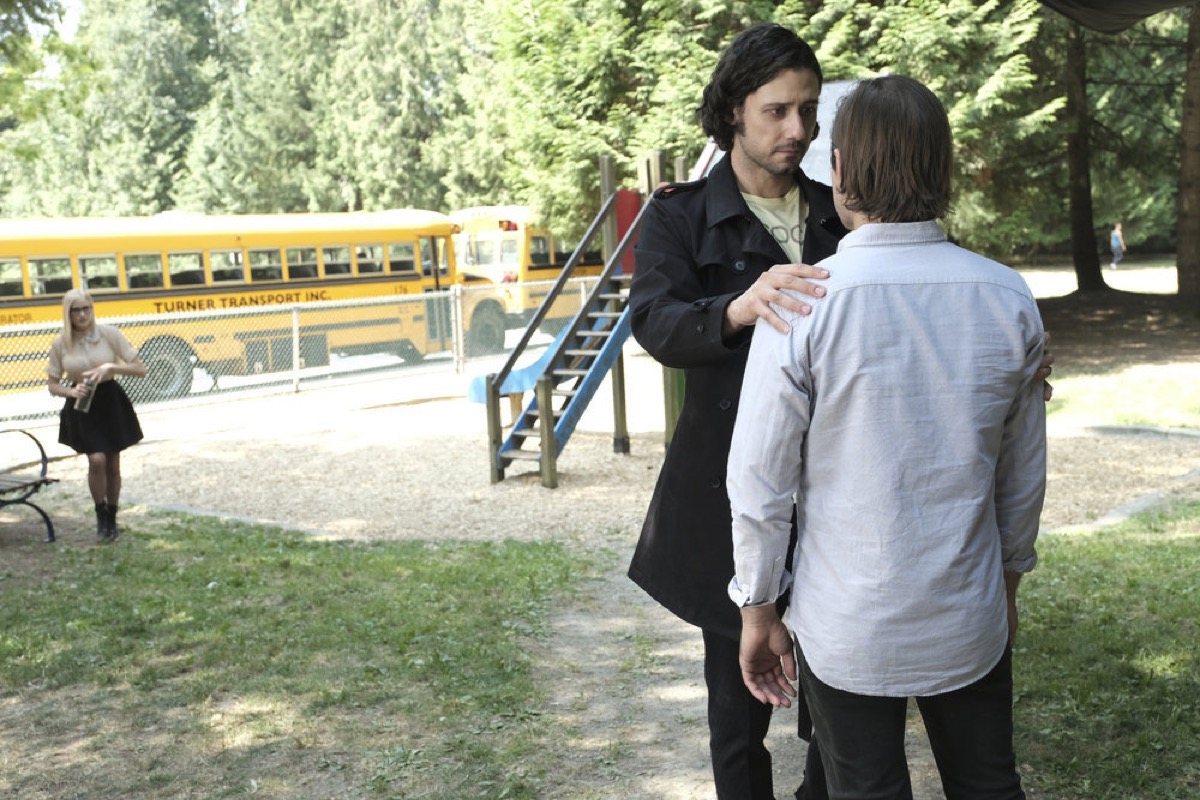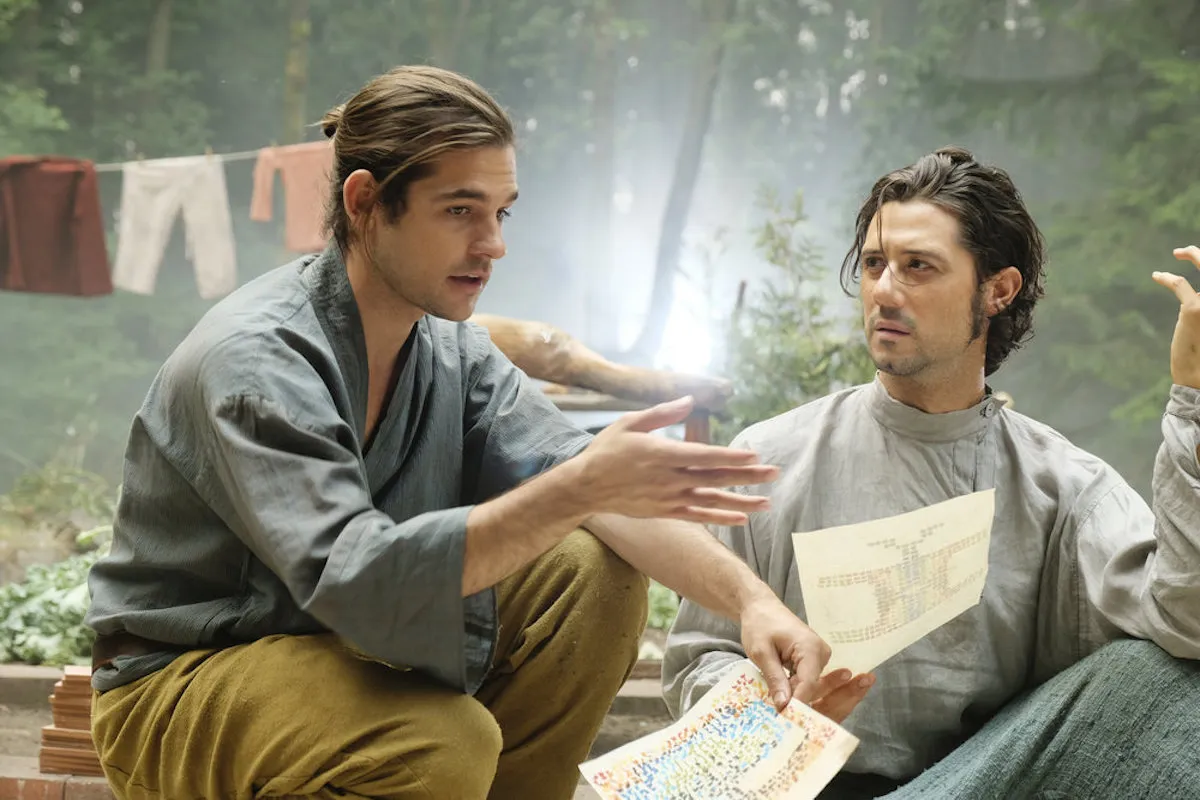Syfy’s The Magicians has done something rarely seen in genre TV—or any TV, for that matter—with its recent romantic developments, marking a new era in the long history of fandom.
In 1997, Xena: Warrior Princess aired the episode “A Day in the Life.” It’s just what it sounds like: a humorous look at a single day in the life of Xena and her trusty gal pal, Gabrielle. They fight a giant, play twenty questions and take a bath together, among other things. It’s a great episode and it quickly became iconic among those that saw Xena and Gabrielle as more than friends.
Xena was famous for many reasons, but one of them was how the show winked at audiences with all sorts of lesbian subtext between Xena and Gabrielle. In later seasons, their reincarnations got married, and there was even a sort of kiss between them in the final episode of the show. It was enough to make Xena a queer icon, even though it was never explicit that Xena and Gabrielle were lovers.
What we had with Xena was about all that shippers of queer couples could hope for then, and that lasted for decades after. Those of us who longed for queer relationships in genre shows had to be content with longing looks, ambiguous declarations of devotion, and so so much unresolved sexual tension.
And we made do. After all, the spaces left empty by canon are where fandoms thrive. What else is fanfic for if not filling in those gaps, nudging two characters from a maybe into a definitive romantic declaration. Ever since Star Trek fans coined the term “slash” to categorize romantic fic about Kirk/Spock, fandom has lived on subtext. Nowadays, slash ships like Destiel, Stucky and JohnLock dominate sites like Ao3 and Tumblr, but in recent years, things have begun to change, and we’re finally moving beyond the subtext.
It’s hard to say when this shift began. Maybe it was Brittany and Santana on Glee going from a fandom only ship to an onscreen couple. Maybe it was Magnus and Alec on Shadowhunters serving as the romantic anchor for the entire show, including an episode entitled “Malec.” It could have been the myriad queer characters introduced to the Arrowverse, from Sara Lance to Alex Danvers to John Constantine, or the uber-queer glory of Wyonna Earp.
Even with all of that, we had never seen a male-male fan ship go from fandom to canon, despite the fervent hopes of fans of shows like Teen Wolf, Sherlock, Merlin, and Supernatural. In some cases, those hopes went from fun to dangerous conspiracy theories that led to serious disappointment, but in the episode “Escape From the Happy Place,” The Magicians changed everything.
Some background for those of you that aren’t caught up with The Magicians (to which I say, “Why?” It’s one of the best fantasy shows on television right now on at least a dozen levels):
The ostensible “hero” of the series is Quentin Coldwater (Jason Ralph), a lost puppy of a man, looking to prove himself in a world of spells and monsters. Much of the first and second seasons were anchored by Quentin’s doomed romance with Alice Quinn (Olivia Taylor Dudley), the uptight Hermione of Brakebills University (think Hogwarts with more keggers and magical STDs).
This relationship wasn’t great for either party, but there was some high drama, especially after Quentin cheated on Alice and she subsequently turned into a being of pure magic, but the relationship that fans of the show really got into was the one between Quentin and charismatic, debauched, and openly queer Eliot Waugh (Hale Appleman). There was always affection between the two men, and Eliot was part of the strung-out threesome, along with Margo (Summer Bishil), that led to the Alice-Quentin break up.
“Queliot” shippers saw the pair as something tender and pure and, in season three, were rewarded with one of the series most beautiful and poignant episodes, “A Life in the Day.” The title itself is even an inverse of that infamous Xena episode, though I’m sure it wasn’t intentional. Even the content was the inverse: Forced by magic and time travel to work on completing a magical mosaic for fifty years, Eliot and Quentin lived together, hooked up, raised a child, and eventually died, thus showing the true beauty of life.
Their entire life was shown in a heartrending montage, a sublime gift to Queliot fans. Just that was a big step for any show—to allow a male/male queer couple to step to the fore, even for a single episode—but there was still ambiguity, and the two returned to their normal timeline with the memories of their life together. They sat, speechless, processing the truth of their relationship, and that was how “A Life in the Day” ended—and most viewers figured that was the end for Queliot. After all, they grew old together; it’s one of the happiest endings a ship can get and still continue.
But The Magicians wasn’t done. In “Escape From The Happy Place,” Eliot is trapped in his own mind by the ancient Monster that has taken over his body this season. To break free, Eliot has to confront his most tragic and traumatic memories, and it turns out his worst memory is the scene we didn’t see after Quentin and Eliot remembered their time together.
In that moment, Quentin explicitly told Eliot they should go for it, romantically, because “Who else gets that kind of proof of concept?” and Eliot … turned him down. Refusing the love of someone “good and true” because he was afraid is Eliot’s greatest regret, and after kissing the memory of Quentin, Eliot breaks through into his body long enough to tell the real Quentin he’s alive, reference the “proof of concept” declaration, and turn “peaches and plums, motherfucker” into the most romantic words ever spoken. It’s worth noting that, in the same episode, Alice and Quentin definitively end their love story, the one that was supposed to be “endgame.”
With this move, the central love story of The Magicians has gone from a hetero one to a queer one. In this week’s installment, we once again saw Quentin ready to die rather than see Eliot’s body hurt by the monster, and a scene that previously would have simply been a goldmine for shippers and fan analysis was clearly and unambiguously romantic. To know that it was romance that we as the audience were meant to see was such a relief from the constant hunting for clues and grasping at straws that defines so much of slash shipping.
The writers of The Magicians did what so many other shows have been afraid to: They saw the chemistry between these characters, saw the same love that shippers did, and went with it. I can’t express enough what it meant to me, as a fan who’s been entrenched in slash since my teen years of watching Gundam Wing and Interview With the Vampire, to see a relationship go from subtext to canon to the guiding love story of an entire season.
It was, well, magical to see how elegantly and easily the romance between Quentin and Eliot was allowed to blossom and thrive. It made me rethink what could be possible (or impossible) for other media, and it even made me sad that we’ll probably never see such a tender romantic moment for couples like Sherlock and John Watson or Dean and Castiel, who exist on shows with a view of subtext and possible queer romance that now seems positively outdated in a landscape where Queliot (and Avalance and Wayhaught and more) have made queer rep just another beautiful part of outstandingly told stories.
Fandom is about filling in the empty spaces, about shipping whatever you want and making a text your own, but it’s also about seeing something onscreen that reflects you and touches your heart. For so long, fans have been begging the shows they love to simply see them, to do something to confirm they’re not crazy for thinking two handsome boys who would die for each other should smooch.
And a show finally did it. We’re in a new world now, where shows like The Magicians prove anything is possible, and that sometimes, the only thing holding us back from happiness is fear.
(featured image: Eike Schroter/SYFY)
Jessica Mason is a writer and lawyer living in Portland, Oregon passionate about corgis, fandom, and awesome girls. Follow her on Twitter at @FangirlingJess.
Want more stories like this? Become a subscriber and support the site!
—The Mary Sue has a strict comment policy that forbids, but is not limited to, personal insults toward anyone, hate speech, and trolling.—










Published: Mar 1, 2019 11:23 am